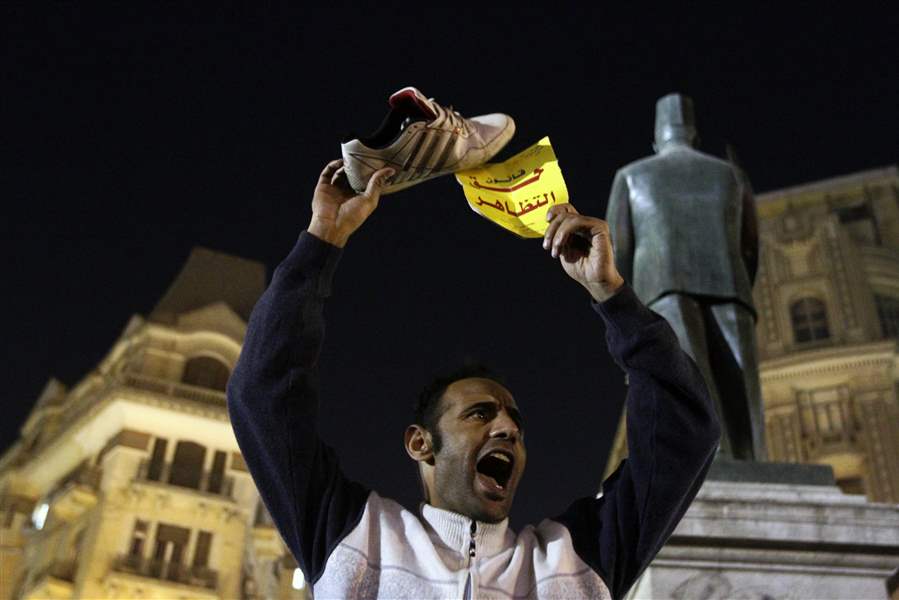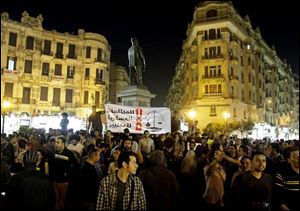
Egyptian authorities detain 24 for protesting
11/27/2013
In this Tuesday, Nov. 26, 2013 photo, an Egyptian activist holds up a shoe in protest in Talaat Harb Square in Downtown Cairo, Egypt. Egypt's state news agency says the prosecutor general has ordered a four-day detention for 24 activists detained while protesting a newly passed law criminalizing demonstrations without permits. MEAN also says the prosecutor on Wednesday issued arrest warrants for two leading activists accused of inciting demonstrators. Arabic reads, "The right to protest law." (AP Photo/El-Shorouk Newspaper, Ahmed Abd el-Latif) EGYPT OUT
ASSOCIATED PRESS

Secular Egyptian activists protest in Talaat Harb Square in Downtown, Cairo, Egypt, Tuesday.
CAIRO — Egyptian authorities took a step today toward prosecuting 24 detained activists for holding a street rally and violating a new law banning protests without permits, fueling calls for new protests in a mounting confrontation between the military-backed government and democracy advocates.
The Cabinet vowed to continue implementing the law, linking it to Egypt’s fight against terrorism, a term used to label actions by supporters of ousted president Mohammed Morsi and his Muslim Brotherhood group. Still, the Interior Ministry appeared to be trying to avoid an immediate clash, saying it has granted a permit for a protest today.
The announcement by prosecutors that the activists would be held for questioning came a day after security forces broke up two small protests in Cairo by secular activists, blasting them with water cannons and beating many. A group of around a dozen female protesters were detained by police and dropped off in the desert in the middle of the night to intimidate them, several of them said.
It was the first implementation of the controversial protest law issued earlier this week which rights experts, activists and some politicians allied to the government have blasted as dragging Egypt back into the authoritarian ways of Hosni Mubarak, who was ousted in 2011.
The government has said the law is necessary to put an end to persistent protests by supporters of Morsi, the elected president who was removed by the military in July in popularly backed coup. Instead, it has sparked a confrontation with secular youth activists and revealed fragility of the loose alliance that emerged after the coup against Morsi.
Youth groups called for protests today to press for the detainees’ release and push the government to abolish the law. By midday, a handful of protesters headed to Cairo’s city center.
The Interior Ministry said on its Facebook page that it had given the protesters permission to hold their rally later today. While it was not clear if any of the organizers applied for the permission, the new law requires organizers to apply for a permit at least three days ahead of the demonstration, suggesting that the ministry acted unilaterally to avert a repeat of Tuesday’s scenes of violence.
Still, the Cabinet said in a statement that it is determined to implement the protest law with “all firmness and force” and give full support to the police, “so freedom doesn’t turn to chaos.”
“In this era of Egypt’s history where the nation is facing mounting dangers of a war led by the great national army and its brave police against the terrorism of the Muslim Brotherhood members in Sinai,” the statement read, adding, “there are elements that want to spread chaos inside in a desperate attempt to hurt the awe of the state.”
In the Mediterranean city of Alexandria, security forces fired tear gas and dispersed a small demonstration of around 100 people in front of a courtroom to denounce the new law. Witnesses said police struck just moments after they gathered, before they even raised their banners.
The prosecutor general today ordered 24 activists detained the day before held for four days for questioning on possible charges of violating the protest law.
In a statement, his office accused the protesters of “chanting antagonistic slogans against the state” and refusing to listen to the “advice” of security forces to end their demonstration. It said the demonstration “disturbed traffic and affected citizens’ interests,” terms mentioned in the protest law as violations justifying police action. It also accused them of attacking a police officer and taking his telephone.
The prosecutor also ordered the arrests of Alaa Abdel-Fattah and Ahmed Maher, two top activists, on suspicion of inciting others to break the law, the state news agency MENA said.
Tuesday’s demonstrations — each by around 100 secular youth activists — took place in downtown Cairo and then outside the parliament building to denounce a proposed constitutional amendment allowing military courts to try civilians.
Footage from the scene showed police beating up protesters and tearing their clothes while dragging others by the hair. The images, reminiscent of the days of Mubarak, went viral on social networking sites and sparked a wave of anger against interim authorities. Activists said that female protesters were sexually assaulted.
Prominent activist Mona Seif, who was among the female protesters detained, said in a video clip posted on social networking site that protesters were “dragged, beaten up, pushed inside (police) trucks by force” before they were taken on a long ride to the desert. Finally, police dropped them off alone in a remote part of the desert.
“They want to terrorize us,” she told reporters.
The liberal al-Dustour party warned in a statement that the crackdown raises concerns that “the arc of democracy and freedom of speech continues to go down and will take us back to what the people suffered from under Mubarak and Morsi, of suppression, injustice and shutting of mouths.”
The party was founded by leading democracy advocate Mohamed ElBaradei who joined the military in its coup against Morsi and was briefly vice president in the interim government. But he resigned after security forces’ bloody crackdown on Morsi’s supporters.
The interim president’s political adviser, Mustafa Hegazy, defended the law and criticized opponents for overlooking its original purpose, which is to deter pro-Morsi protests — something he describes as a major demand by Egyptians.
“A big bloc (of Egyptians) that is perhaps the least noisy ... is harmed by the systematic violence that starts with political protests,” Hegazy told Dubai-based MBC network late Tuesday night in reference to Islamists’ protests.
But some supporters of the government warn that the new law will increase opposition and push secular activists into a common cause with Islamists.
The Islamist coalition supporting Morsi sought to reach out to secular activists today, with a statement denouncing “brutal repression” and saying the “youth of the revolution stand united.”
The spokesman of the Muslim Brotherhood-led coalition, Diaa al-Sawi, said he will contact youth activists to coordinate rallies.
The youth groups, which joined the massive anti-Morsi protests that preceeded his ouster, quickly shot down any coordination.
“A message to the Muslim Brotherhood: we will not put our hands in the hands of those who betrayed and hijacked the revolution,” said Hossam Moanis, spokesman of one activist group, the Popular Current.